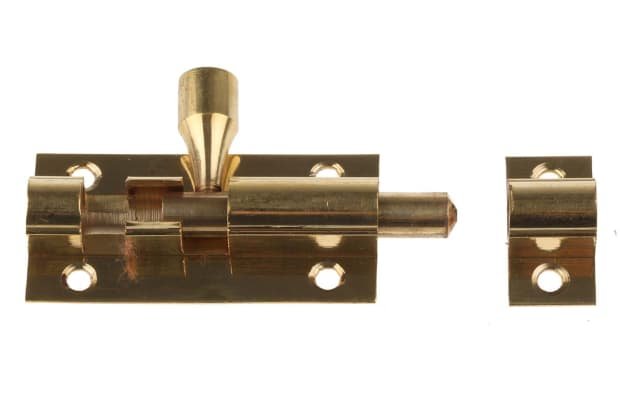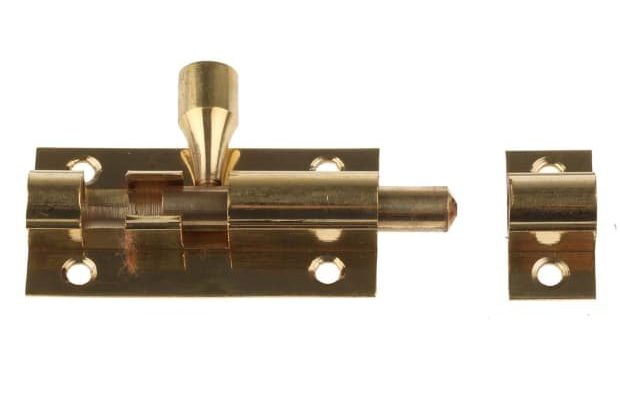
Every material has its pros and cons. As we dig deeper into this topic, you’ll start to see why the choice of latch bolt material isn’t just about looks; it’s about safety, longevity, and performance. In this article, we’ll compare steel and brass door latch bolts, helping you make an informed decision based on your needs. Grab a cup of coffee, and let’s dive into the fascinating world of door latch bolts!
Understanding Steel Door Latch Bolts
Steel is one of the most robust materials for door latch bolts. When you think of strength, steel often comes to mind first. It’s hard, heavy, and resistant to physical attacks. This makes it an excellent choice for areas that require high security. For instance, if you live in a part of town where break-ins are more common, a steel latch bolt could provide that extra peace of mind.
There are different types of steel used in latch bolts, including stainless steel, which has the added benefit of resistance to rust and corrosion. This is particularly important if the door is exposed to the elements. Imagine a latch bolt that works well, rain or shine—stainless steel does just that.
However, steel isn’t without its downsides. The weight of steel latch bolts can sometimes be a disadvantage. A heavier bolt might be harder to install and can put more strain on the door over time. Plus, if you’re looking for something that has a polished look, steel might not fit the bill the way brass would.
The Charm of Brass Door Latch Bolts
Brass bolts are often chosen for their aesthetic appeal. This material has a warm, golden hue that many people find attractive for decorative doors. Imagine walking up to a beautifully designed front door with gleaming brass fittings—it’s inviting and adds a touch of elegance to your home.
Beyond looks, brass also has certain practical advantages. For one, brass is resistant to corrosion. It doesn’t rust like steel can, making it a great choice for humid environments. If you’re in a coastal area where saltwater can be an issue, brass may be more forgiving.
One thing to note, though: brass tends to be softer than steel. This means it may not hold up as well against forceful impacts. If security is your top priority, you might want to weigh this factor carefully. A brass latch bolt could be perfect for a well-protected entryway but may not be ideal for a back door that isn’t visible from the street.
Comparing Durability Between Steel and Brass
When it comes to durability, steel often takes the crown. It can withstand significant force, making it the go-to for security applications. Think of it like a fortress; it’s built to resist attacks. Steel latch bolts can last for years under heavy use, especially if made from high-quality materials.
Brass, while not as tough, has its own kind of durability. It can handle exposure to moisture better than steel, which gives it a longer lifespan in certain environments. If you’re in a place where rust is a problem, brass might survive longer than its steel counterpart.
Still, it’s crucial to consider where these latch bolts will be used. For example, if you’re installing a door that sees heavy traffic or needs to be able to withstand forced entry, go for steel. But if you want something that looks attractive and you’re less concerned about security, brass could be a smart choice.
Cost Considerations for Steel vs. Brass
Cost is another factor to consider when selecting latch bolts. Generally, brass latch bolts can be more expensive than their steel counterparts. This is mainly due to the manufacturing process and the quality of the material itself. Brass is often seen as a premium option, and while you might pay a bit more upfront, you could end up getting a visually appealing product.
On the other hand, steel latch bolts are usually more affordable. If you’re on a budget or looking to secure many doors, steel might be the better option. You can often find high-quality steel bolts at a lower price than brass ones, getting the necessary security without breaking the bank.
Ultimately, your choice will depend on your budget and what you value more—durability and security, or aesthetics and corrosion resistance. Don’t forget to factor in long-term costs, such as how often you may need to replace each type over the years.
Installation and Maintenance of Latch Bolts
Both steel and brass latch bolts are relatively easy to install, but there are a few nuances. Steel bolts may require a bit more effort due to their weight and sturdiness. The installation process can vary slightly depending on the specific design, so it’s essential to follow the manufacturer’s instructions closely.
Brass bolts may benefit from less physical strain during installation, but their softer nature means you should be careful not to overtighten screws or bolts, which can cause them to become damaged. Also, brass can tarnish over time, so regular maintenance is crucial. Cleaning the surface with a gentle brass polish can help maintain its shine.
With steel, maintenance is much simpler. A quick wipe-down and checking for rust are usually all you need to do. However, ensure the screws and mechanism are still working correctly, especially if they’re exposed to harsh weather conditions.
Security Features and Effectiveness
When it comes to security, steel has the upper hand. Steel latch bolts are designed to withstand forced entries and attacks. If you’re concerned about home security, investing in a high-quality steel latch bolt is a smart move. They often come with additional features like reinforced strike plates, which further enhance their security.
Brass latch bolts, while elegant, may not provide the same level of protection. They do offer a basic level of security, but if someone is determined, it could be easier to pry them open compared to a steel bolt. That said, adding a deadbolt or secondary locking mechanism can improve security for doors with brass latch bolts.
Ultimately, you should evaluate your security needs and choose accordingly. If you want peace of mind, go for steel. If you’re prioritizing style and your door isn’t a primary entry point, brass could work.
Making the Right Choice for Your Needs
Choosing between steel and brass door latch bolts boils down to your specific needs. Here’s how you can approach this decision:
- Security Needs: If securing your home is a priority, opt for steel bolts.
- Aesthetic Preferences: If you want something beautiful and decorative, brass will be more appealing.
- Environment: Consider local weather and humidity—brass handles moisture better.
- Budget: Steel bolts tend to be more budget-friendly, while brass can be pricier.
- Maintenance: Steel requires minimal upkeep, while brass needs periodic polishing.
By evaluating these criteria, you can make a well-informed choice that aligns with your preferences and requirements.
In conclusion, both steel and brass latch bolts have unique qualities that make them suitable for different situations. Steel is robust and durable, perfect for high-security needs, while brass adds a touch of elegance and performs well in humid conditions. Your decision will depend on what matters most to you: security, aesthetics, budget, or maintenance. Whatever you choose, ensure that your door latch bolt is up to the task of keeping you safe and secure.
